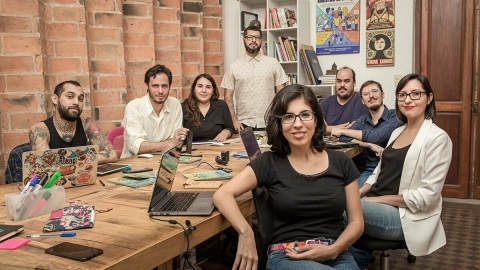
When El Surti first began publishing hard-hitting visual journalism five years ago, it quickly developed a loyal base of followers in Paraguay drawn to the startup’s novel approach to storytelling. El Surti wasn’t just providing independent, visually compelling coverage on corruption, disinformation and more – it involved audience members as collaborators along the way.
It wasn’t until it took part in Velocidad, a media accelerator run by ICFJ and SembraMedia with support from Luminate, that El Surti’s team realized the full potential of the model. With investment and business coaching through Velocidad, they made the critical decision to market their methodology to newsrooms across Latin America, scaling up a practice that builds trust. This, in addition to developing a regional client base for its communications services, diversified El Surti’s revenue streams, helping it to expand its staff from five to 19 members.
The result: increased income and editorial impact. During a pandemic.
I love this story, because it shows what is possible for independent media today. El Surti’s case is just one success story from Velocidad, an initiative that serves as a model for how to effectively support independent media working against the odds to strengthen their business models. Velocidad has invested nearly $1.5 million in 10 Latin American news outlets serving the public interest. Our grantees brought in new revenue that was more than six times the amount of the grants they received, helping them produce journalism that strengthens fragile democracies, holds leaders to account and builds audience trust.
Examples of that journalism:
- An investigation by CIPER in Chile showed how the government was minimizing COVID-19 figures, leading to the health minister’s resignation.
- El Pitazo in Venezuela exposed mismanagement in the oil industry that resulted in a loss of $3.7 billion.
- And a report by Ponte Jornalismo in Brazil won the release of two people imprisoned for crimes they did not commit.
Reporting like this is not possible if media outlets are not financially sound. That’s why Velocidad, and other initiatives like it, are so crucial. You can learn more about El Surti’s journey (which continues!), and check out other case studies and learning guides from Velocidad, one of many ICFJ initiatives designed to help newsrooms thrive.
Thank you as always for your support.